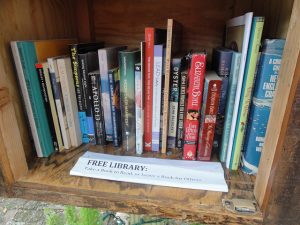traditional publishing
Image – iStockphoto: Inner Vision
‘Get the Message Across More Forcefully’
Last week’s AWP conference—the Association of Writers and Writing Programs (February 8-11)—was the usual sea of campus-based students and faculty members, university presses, plus assorted services for publishers and authors.
Early estimates were of some 12,000 people being in attendance. The book fair area of booths and tables was said to have more than 850 outfits represented. And in roughly 550 sessions, attendees heard and debated issues, many of them based in questions of diversity. I wrote an advance piece at Publishing Perspectives on the program’s stated mission of inclusiveness.
Being set as it was in Washington, D.C., however, the political nature of so many of its admirable points of support for writerly egalitarianism was heightened. Some of the attendees participated in demonstrations of their political leanings. I’d guess that very few sessions went by without some mention, pro or con, of the White House administration a few blocks away.
From the hotel, I could see the top of the Washington Monument and the Capitol—they seemed farther apart than in the past.
I was on a panel called Current Trends in Literary Publishing, a session that’s put together and moderated annually at AWP by Jeffrey Lependorf of CLMP, the Community of Magazines and Presses dedicated to literary work and to literary journals in particular. With us were Katie Freeman of Penguin Random House’s Riverhead Books; Dawn Davis of HarperCollins’ Amistad; Literary Hub’s Jonny Diamond; and Michael Reynolds of the independent publisher Europa Editions.
It was Reynolds who, in reminding us that Europa Editions was originally founded in Italy, told the audience that current events are causing houses like his to reflect on why they choose to publish literary fiction. His house has a Turkish author, for example, who’s currently jailed by the regime there, as are many in publishing and journalism. And as the pressures of nationalism increase in many parts of the world, including the States, the Philippines, the United Kingdom, France, what is it about serious fiction that seems to resonate so strongly for so many?
“What about current events,” Reynolds asked, “makes it important to publish literary fiction?
“Do we need to provide more context?” he asked. “Do we need to frame our publishing program differently in order to get the message across more forcefully in this moment?
“In publishing literary fiction,” Reynolds said, “I think we all know that reading fiction—reading fiction in general—is good for our empathy. And I think a publishing program can think about social empathy, and global empathy.”
Several of us on the panel would go on to seize on that phrase Reynolds had given us, “global empathy.” My own key message to the event was very close to his but with that usual provocateur angle: I urged the room of several hundred people to take their belief in literary fiction—and especially in its peculiar capacity and internationalism to promote “global empathy”—and begin to speak more loudly, more proudly about it. I see this political era as a stark opportunity to demonstrate literary’s importance.
And that brings me to my provocation for you today.
Read MoreI’ve been an avid Amazon shopper since the mid-90s. It started with books, but as we moved into the 21st century it’s come to where I now buy everything from groceries to musical instruments from this Seattle-based behemoth. From the start, one of the biggest differentiating features Amazon offered was its user reviews. I have found those reviews absolutely invaluable in making informed purchasing decisions, and I’m not aware of any other online retailer with a more comprehensive or helpful body of user reviews.
I like to think of myself as a give-something-back guy (in addition to being ruggedly handsome, of course), so I’ve made an effort to post reviews of products about which I had passionate opinions – either positive or negative. The vast majority of reviews I’ve posted have been positive, because I want to champion products that I think more people should be aware of. But over the years I’ll admit there have been a handful of products I’ve felt the need to publicly slam. Today’s post is about one such slamming.
Half a dozen years ago (which sounds nowhere as cool as “four score and seven years ago,” but I wasn’t around back then, and neither was Amazon; nor were Presidents tweeting about women’s clothing lines – but I digress…), I became aware of a new book that was making a lot of waves. It approached a popular topic by using an extended metaphor in what appeared to be a very clever way. Most of its reviews were positive, and I was intrigued enough to want to read it. So, being a lifelong cheapskate, I did what I usually do when I am interested in a book by an author whose work I’ve never read: I looked for it at my public library. They had it, I checked it out, and we were off to the races.
The book started strong. Really strong. I was digging it, and loving the metaphoric architecture the author had created. (And, truth be told, starting to feel the pangs of envy I inevitably experience whenever I encounter a writer who seems to have more game than me.)
But then something happened. The book started to fall apart. The story became tedious and petty, the architecture more and more contrived and gimmicky (which I wasn’t sure was actually a word, but my spellchecker isn’t raising any eyebrows over it. If spellcheckers have eyebrows, that is. Which would mean they’d also need to have eyes. Possibly even noses, for sniffing out grammatical stinkiness – a word over which my spellchecker *did* raise an eyebrow. But I digress again…).
In short, the book turned into a major disappointment. Yet it was selling like hotcakes, with mostly positive reviews. So I did what I felt needed to be done, out of my duty to the clientele of the store from which I buy all my books (and all my ukulele strings, and all my smoked oysters, and all my toothpaste, and, and, and…) – I logged into Amazon and reviewed the book, sharing my candid opinion of the author’s work.
More succinctly, I trashed it.
Read MoreImage – iStockphoto: Anya Berkut
Diversity in DC
Next week, as you may know, the Association of Writers and Writing Programs holds its sprawling annual convention.
It’s known as AWP. As every eagle-eyed Unboxed Writer will notice, it should have been AWAWP. I like the sound of that. A-wawp. A wet fish landing on a hot dock. But they didn’t ask me, did they? Well, of course they didn’t.
AWP will be seated this year, 8 through 11 February, in Trumpian Washington. Our nation’s extraordinarily stressed capital. We must not hold this against the AWP organizers, who are based at George Mason in Fairfax: Major conferences are booked years in advance to capture the convention-center and hotel-room space they need. In fact, next year, a happier locale for AWP—Tampa, the Tropic of Porter. Our dolphins are standing by. And better yet, our politicians are not.
The AWP conference is a movable feast of diversity, last May for example rejecting Charlotte and all similarly inclined locations for future consideration because of its anti-LGBTQ “bathroom laws.” Next week, on Thursday the 9th, alone, there are sessions on:
Those are before noon on the 9th. You see, never is heard an exclusionary word at AWP. And this is good.
No, the main qualm that some of us feel here in the competition-soaked commercial world of publishing has to do with that halls of ivy business. While many of us have spent a lot of time in the Academy, of course, we know that students of creative writing on our campuses are rarely fully prepared for the business they expect to storm upon graduation. Many instructors aren’t equipped to teach them, either, finding most of their contracts at their own university presses, where beautiful production and meager sales are the norm, marketing is all but unknown.
Precious few of these students may have been told, even today, how much scarcer traditional publishing contracts have become, let alone that US self-publishers in 2015 produced 625,327 titles with ISBNs. Those indie books without ISBNs take the number of self-published books—before the trade even gets out of bed—well above 1 million titles per year.
There are sessions at AWP, mind you, that get at a bit of this. Our good colleague Paula Munier is on a business-of-publishing panel with some other good folks, also on the 9th. But get this title: “Agents and Editors and Publishers, Oh My! [Are we tired of that Oz formulation yet? Yes, we are.] Demystifying the Business Side of Writing and Publishing.” Now, think about that. Students of writing in college (hotly pursued by MFA programs at AWP) need a 75-minute session on business demystification at a conference?
So what are they teaching the kids back on the collegiate ranch?
Well, I’ll tell you what they’re teaching, and that’s […]
Read MorePlease join us in welcoming new contributor Natalia Sylvester to Writer Unboxed! Born in Lima, Peru, Natalia Sylvester came to the U.S. at age four. A former magazine editor, Natalia now works as a freelance writer in Austin, Texas and is a faculty member of the low-res MFA program at Regis University. Her articles have appeared in Latina Magazine, Writer’s Digest, The Writer, and NBCLatino.com. Her debut novel, CHASING THE SUN, was named Best Debut Book of 2014 by Latinidad and was chosen as a Book of the Month by the National Latino Book Club. Her second novel, EVERYONE CARRIES THEIR OWN WATER, will be published in 2018. You can connect with Natalia on Instagram here. Welcome to WU, Natalia!
On the first week of the new year and for my first post as a regular contributor (hello, WU fam!) it seems only fitting to write about beginnings.
But not new ones. Not the fresh starts or the “New Year, New Yous” messages we are so often bombarded with this time of year. Not the literal and figurative blank pages that are so exciting-we-will-finally-get-them-right-this-time-omg-no-pressure-right?!
Because really, we’ve been here before.
How many January’s have unfolded before us, ripe with potential?
How many first lines, first chapters, first drafts?
How many times has the progress in our Works-in-Progress marched forward, only for us to end up back at square one?
Each time we start over, we find we know (more or less) what to expect. We know what the air smells like in January. We recognize the late-afternoon pastel sky and grey-white trees. But despite being packaged in the familiar, what the year will bring is unknown to us.
And so it goes with our stories. The process will be similar in some ways to the last one—a blank page blossoming into a draft that will be edited, and rewritten, and reworked. But we won’t really know what a story demands of us until it becomes what it’s meant to become.
We are all in different places in our paths, and yet, we will always be beginners.
Starting Over is Still Starting
I’ve been reminded of this countless times in my own writing and publishing journey:
When I signed with my first agent and the book didn’t sell, and I had to start over and write a new one. Faced with that new beginning, I was heartbroken, but once I got back to the writing I recognized that new story for what it was: a new source of hope. (It became my debut, but not my first, novel.)
When, years later, my agent submitted a revised version of that unsold novel to the publisher that had acquired Chasing the Sun, and they turned it down. That rejection, no matter that it wasn’t the first time I’d gotten it, hurt as much as a fresh wound.
When I finally moved on and wrote what I hoped would be my second published novel, only to learn that my agent and I had different visions for the story. After months […]
Read MoreBig news from the New York Times this weekend! Oh, maybe not the news you’re thinking of. A totally different outcome of deep investigative reporting that excavated long-held secrets…
they’ve announced the unmasking of Elena Ferrante, author of the Neopolitan Quartet of novels.
Whether or not the name Elena Ferrante rings any bells with you, her work has become wildly popular worldwide, which I suppose is what made her a target ripe for unmasking. The fact that there is no “Elena Ferrante” — that this is a pseudonym — was not a secret. But an investigative journalist decided that the true identity of this author was something readers needed to know, and now they know it.
I haven’t linked to the actual article for several reasons:
As an author who writes under a pseudonym, this bothers the heck out of me. Not because I think this means I’m about to be unmasked by investigative reporting in a major American newspaper and the international press. No, there are already dozens if not hundreds of people who know what other name I write under, and plenty of connections between my two identities, so the “investigation” could probably be conducted and completed in the time it takes to watch an episode of “Seinfeld,” plus no one would care once the truth were “revealed”, so what would the point be?
I’m troubled by this because it seems to indicate that authors’ identities a) matter and b) belong to the world.
Do our identities matter?
Read MoreWe’d all like to be this popular.
Writers and money have been on the internet this week, notably in an essay by a young woman writer, Merritt Tierce, who published a novel to high acclaim. In the article, she described her despair at being unable to make money as a writer. Plaintively she wrote, “I would, right now, sign in blood a contract that would pay me $40,000 a year for the rest of my life. No advances. No royalties. No freelance checks, no honoraria, no prize money, no film or TV options. At this stage in my vocational life, $40,000 is probably well below my earning capacity.”
The essay irritated me, became a pebble in my shoe. I wanted to just walk away, forget about it, but every time I took a step, there it was, gouging my instep. So why the irritation? I wasn’t sure. I mean, I actually agree with her: it’s damned hard to make an actual living as a writer, even when you’re doing well. Even when you’re award- winning and/or critically acclaimed or get a lot of rights abroad and a bunch of translations or movie deals. The money comes in giant chunks at unreliable intervals at vast distances from each other, or it comes in drips and drabs or not at all.
I get it. The money part of a writing life is not the easy part.
And yet, that pebble in my shoe would not shake out. I poked around the internet to see what I could read about writing and money. I found another essay written by another young woman, Emily Gould, who made a big money deal for her first book, which then failed (8000 copies on a $200,000 advance) and couldn’t sell another. That’s enough money, and a big enough failure, that it really does cause problems for a writer—trouble that will be difficult to overcome.
In contrast, Tierce sold 12000 copies of a hardcover book and was paid a rather modest advance of somewhere between $50-99,000 according to Publishers Marketplace. No way she’d earn out the advance on those numbers, and probably her publisher considers that a failure, too, but they are not as challenging as Gould’s.
Both women talked about selling one book and then struggling to make a go of a career. But Gould’s essay didn’t irritate me in the slightest. She was panicked and poor and doing writing conferences on a shoestring, shamed into buying an admirer’s coffee even though she barely had any cash of her own. Any writer without some other means of support has probably been there. I know I have, many times. But instead of howling about the circumstances, she dove back into the work, trying to write something else, find her voice, live somewhere cheaper than Brooklyn.
Then she zeroes in on this:
“Or maybe the problem—well, a problem—was that I felt entitled to several different lives. In one of these lives, my book has made me famous as a pundit and wit, the kind of person who’s constantly consulted on everything from what feminists should be enraged about to what jeans to buy. This person writes a great book every few years […]
Read MoreMany authors spend years (if not decades) seeking a traditional publishing deal. Unfortunately, when the offer comes, it isn’t always a good one—and knowing when to walk away (and having the strength to do it, despite the steepness of the road) is one of the most important business skills an author can develop.
While no one can, or should, tell you when to refuse a contract, let’s look at a few situations when wise authors should consider walking away from a publishing deal:
1. When the publisher is a vanity press, a scam, or taking advantage of authors.
Legitimate traditional publishers never ask the author to pay for anything out-of-pocket (and should pay royalties based on gross receipts or sales, without deducting publishing costs or expenses before calculating the author’s share). If the publisher asks the author to pay expenses or purchase “mandatory copies” of the work, bullies the author during negotiations (it happens!), or does anything else that suggests the publisher or the deal is not legitimate, the author should refuse the deal.
Investigate publishers carefully before submitting your work or signing a deal. If the publisher’s reputation isn’t squeaky-clean, or if anything seems “off,” don’t be afraid to walk away.
2. When the publisher won’t offer industry-standard terms or negotiate a reasonable contract.
Sometimes, even legitimate publishers’ contracts don’t meet industry standards for fairness. Most publishers are willing to negotiate, but if the publisher won’t budge on terms you consider vital, it’s better to walk away than to sign a contract you consider unreasonable or unfair.
I strongly recommend that authors obtain professional assistance with contract negotiations. Hire an agent or publishing lawyer who knows the industry to advise you or negotiate on your behalf. That said, each author has the right to determine the business terms (s)he is willing to accept. You have the power to refuse any deal that doesn’t meet your business standards.
3. When the publisher lacks the experience or capacity to publish and distribute the author’s work appropriately.
Read MoreThis past June, I got a tattoo: three ginkgo leaves that span nearly the length of my inner forearm. The leaves dance in an invisible breeze, and I love it. My mother-in-law believes it’s a temporary tattoo, one that will rub off with summer swims in Seattle-area waters of body—lakes, canals, chlorinated pools, Puget Sound. But no, it’s not going anywhere.
One of my dear friends and writing partners told me, “You know what I love most about your tattoo?” Without waiting for me to answer, she waved her hands in circles, palms open toward me, indicating my whole exterior: my Capri pants and gingham-checked blouse, probably my cross necklace too. “This,” she said. “This outfit and you and a tattoo. It doesn’t make sense in all the right ways.”
Getting a tattoo, however, was not about getting a tattoo. It was all about the ginkgo leaves.
Read MoreAs writers, we are told about many rules we’re supposed to follow. Avoid adverbs. Don’t start with a prologue. Eschew the passive voice. Don’t use words like “eschew.” On the off chance that someone does say “eschew,” say “gesundheit!”
Okay, maybe not all of those are well-established rules, but the first few definitely are. And I have a problem with rules like these (to be fair, I have a lot of problems, as some of you likely have guessed). But today I’m going to write about the problem I have with one rule in particular: the one that says we should eschew (gesundheit!) the passive voice.
What it is (and what it ain’t)
First of all, what is the passive voice? It’s a way of constructing sentences where the subject has the action done to it, rather than performing the action. For example:
The treaty was signed by the two generals.
The most awesome post ever was written by Keith.
The egret was eaten by the alligator.
In each case, the action happened TO the subject of the sentence (treaty, post, egret).
By contrast, here are the same three sentences cast in the active voice:
The two generals signed the treaty.
Keith wrote the most awesome post ever.
The alligator ate the egret (and then sang, “Egrets? I’ve had a few,” in a surprisingly good Sinatra impression).
In each of these active-voice examples, the subject of the sentence (the generals, Keith, the alligator) is performing the action. Both sets of sentences say the same thing, but conventional wisdom maintains that the ones written in the active voice are stronger and more vigorous. If that increased strength and vigor is not immediately apparent, let’s find some better examples.
The boy closed the door.
The door was closed by the boy.
or, even worse:
I think most of us would agree the second sentence is pretty weak in both of those examples. If nothing else, the first sentences are definitely cleaner. So these are situations where the passive voice probably is the weaker choice. Similarly, there are plenty of instances where too much use of the passive voice can really de-energize – and often de-personalize – your writing.
So why am I opposed to the no-passive rule? First and foremost, because many people mistakenly tag sentences as passive that actually are not. Over the years that I’ve spent interacting with writers both online and in person, I’ve seen a lot of misunderstanding of what the passive voice is – and what it isn’t. So let’s take a quick quiz to see how well we understand this passive thing.
Read MoreThe free book is a delightful and welcome creature. Even more delightful is the Advance Review Copy or ARC, also called a galley. These are, as the name suggests, advance copies of books – available months before the finished book goes on sale, intended for the purpose of review. Book bloggers can often get their hands on ARCs by emailing the publicity department at a publishing house, requesting them through a system like Edelweiss or NetGalley, winning them on Goodreads, or by attending trade shows such as BookExpo America.
But there’s an etiquette around ARCs, and like so many things in the publishing industry, it isn’t always clearly spelled out in writing. So here are some key do’s and don’ts to keep in mind when you find yourself in possession of an ARC.
DO: write an online review. This is the entire intent of ARCs, and just keeping a free book for yourself is not the point. Free is fun, sure, but publishers produce them for a reason, and the reason is not to shore up a leaning coffee table or give you something to read at the pool that you don’t mind damaging with water and smears of sunscreen. All you’re obligated to do – just one thing – is to write a review. Which brings us to…
DON’T: feel obligated to write a glowing review just because the book was free. Sure, that’s what we’d all prefer (speaking as an author here!), but it’s not a requirement. The requirement is for an honest review, not a positive one. If you don’t like the book, you’re within your rights to say so – just be sure you explain why. Professional reviewers don’t fulfill their obligations with a one-star “HATED IT” on Amazon, nor does any responsible reviewer, paid or unpaid.
Read MoreAll writers are readers first. We learn what books are and what they can do for us by reading them. And we come to love books written by others in a way that makes us long to write books ourselves.
But it’s absolutely crucial that once we become writers, we don’t give up on the reader within.
It’s true that being a writer changes your relationship with books. More than once I’ve been reading a book and found myself so critical as a writer (“why did she make that character do that?”) that I couldn’t enjoy or even experience the book as a reader.
That said, reading made you a writer in the first place, and better reading makes for better writing.
What do I mean by reading better?
Read other writers’ works in progress. Nothing sharpens your skills for editing your own writing like editing someone else’s. You see flaws more easily, you develop a sense of what might be done to correct them, and you’re then more likely to recognize the same issues when they crop up in your own work. It’s also a key way to be part of the writing community — you read and critique for them, they read and critique for you. You’re performing a valuable service, and you’re learning along the way. I can’t emphasize enough how important this is to a writer’s development.
Read your market. My reading interests are all over the map, from women’s fiction to sci-fi to contemporary literary to straight-up category romance, and I know any genre can be done poorly or well. But since I started writing historical fiction, everything has shifted. Right now about 50 percent of my reading is historical fiction, and most of that in 19th- and 20th-century American settings, since that’s what I write. I owe it to myself, my agent, my editor, and my readers to know what else is out there. Reading widely in my genre hones my sense of what my readers are finding elsewhere and what I might be able to offer them that they haven’t seen before. You can’t do that from a list of titles and back cover copy. Read widely and deeply, cover to cover.
Read for pleasure — really. As I said above, I do find myself slipping into editor/writer mode when dissecting certain books, usually blockbuster hits that I’m dying to measure against the hype. But measuring against the hype is a loser’s game. Instead, I make sure that I’m reading at least one book a month for no reason other than it sounds like something I’ll enjoy. And more often than not, I get lost in it. Which helps me on two fronts: it reminds me of the pure joy of reading, and it inspires me to write a book that can have that same effect on a reader.
Q: What do you read for, and how?
[Image: We Like Books, by Jess Ruby at Flickr]
Read MoreDonald Maass’ inspiring post last week showed us how we can tap into vivid personal memories to add new levels of delight (AKA “pixie dust”) to our storytelling. Later that week, Kathryn Craft’s wonderful post delved into how we can use setting to reinforce the emotional state of our characters. Today I’m going to look at some ways to use aspects of both of these approaches, with the goal of taking your readers to a world they’ve never seen – but you have.
Lessons from a loudmouth
Several years ago I stumbled across an indie film called Loudmouth Soup. The film is small in scope, focusing on a Hollywood dinner party attended by seven characters who come from various levels of the food chain within the film industry. Everybody has come to the party with an agenda (some hidden, some not so much), and a tense and often passive-aggressive dance slowly unfolds over drinks and dinner.
A few things make this film unusual. First, it was shot entirely in one night. Second, and probably most unusual, it had no script. (I know some writers who will hate this idea, but please, bear with me.) Instead, the director briefed the actors on their characters’ individual backstories, and then gave each character a set of goals, and then told them to basically do whatever they had to do to achieve them, while the cameras rolled. All the players were experienced Hollywood actors, so the director was calling on them to draw on their “insider” knowledge of those familiar shark-infested waters, and basically act like actors at a Hollywood dinner party.
Oh, and all while drinking heavily. The party may have been imaginary, but the drinks they served were real. So we get to watch a group of actors slowly getting drunk, playing the part of actors slowly getting drunk. Definitely a “meta” moment in filmmaking.
I enjoyed Loudmouth Soup, but I wouldn’t go so far as to call it a great movie (although I agree with much of this five-star review). I’ll admit, the unusual way the movie was made is probably its most interesting facet. If you haven’t lived in L.A. and/or been involved in the entertainment industry, much of the film might be a bit too “inside baseball” to be compelling.
But I have lived in L.A., where it seems everybody has an agenda, everybody is playing an angle, and everybody – from bank teller to studio executive – wants to be somewhere else on the food chain other than where they are right now. And that is exactly what these actors captured so well. Their knowledge of the film business allowed them to truly OWN the world in which the story was set.
For 96 minutes, those seven increasingly drunken actors whisked me back to L.A. and all its best and worst characteristics. I’ve seen few movies that evoked such a specific time and/or place so vividly – and so quickly.
So that’s what I want to look at today: how can we take our readers to a world we know intimately, and make it come to life for them? Here are a few ways – you can likely come up with even more.
Read MoreThis post is not about what content to include in a query letter, it is about how it should ‘sound’–the professional tone the letter should take. It discusses how to address an overburdened agent, editor, or publisher in a manner that makes them consider you a potential business partner, not a supplicant, a novice, an egomaniac, or desperate. That increases the chances that your query letter will actually get read, perhaps even all the way through.
In my day job, I work with a researcher who gets dozens of unsolicited email requests daily—for a job, for a position, for help, for collaboration, for reviews, for submissions, for purchasing equipment, for endorsements, for public appearances. While these inquiries are not quite the same as author queries, after wading through mountains of these unsolicited requests on a daily basis, I’ve developed a short checklist about what to do and what not to do in basic letter-writing terms to keep your message from getting immediately rejected. If some of the suggestions I am about to offer seem commonsense, or even ludicrously obvious, all I will say is that I have abstracted all of the examples of what not to do from actual received inquiries.
Put Yourself in Their Shoes:
The goal of the query letter is not to tell the addressee what you want or need; the goal of the query letter is to convince the addressee why they might want to work with you. Don’t write about how badly you want to be a writer/make a living as a writer/become a bestseller/change the direction of literature. Lots of us want that (LOTS!). Stating it in a query letter simply puts extra social pressure on the reader, which does not increase the desire to continue reading.
First Sentences/Paragraphs.
The decision of whether or not to read a letter all the way through happens within seconds. The opening should sing, better than the fat lady ever did, and in your voice. The first sentences determine whether any more of the letter gets read. The first paragraph establishes whether you have done your research, are professional, would be someone interesting (and sane), someone who might be a good collaborator, and whether you can pitch your work, not your dreams.
Read More
From left to right: Porter A, Therese W, Kathleen B, Vaughn R, Keith C and Donald M, preparing to submit their work to publishers.
In the late 1990s, I wrote a short story—my first ever—and submitted it to The New Yorker. It was a really amazing piece of fiction, one that reflected dozens of minutes of toil and revision. I do not remember the plot (which suggests there was none) except for one detail: the female character sits on a therapist’s couch, and, wrapped in a blanket like a burrito, floats into the air and–poof!–vanishes.
I am certain this 7,000-word work of art was roughly 7,000 words too long.
More than fifteen years later, I see how many things were wrong with that experience. First, the piece was a piece of garbage. I did not know how to write a story, and I had no one guiding me through the process. I should have sought advice from someone, if not another writer, than at least a friendly barista or the wine guy with the radio voice at the Safeway where I buy cheap Riesling.
Wrong thing #2: I had the gall to submit to The New Yorker. Sure, I had read The New Yorker, usually while waiting for my dental appointments, usually looking at the pretty cover or the cartoons because the stories were, well, a little uppity in my opinion. Perhaps I thought that the inclusion of my story would endear me to the other works of fiction. But certainly, even if my story had been an actual work of art, I was not familiar enough with the publication to know whether it would be a good fit.
These days I am a better writer with a better understanding of story structure, and yes, I carry around suitcases of humility. I have given up trying to like The New Yorker’s fiction and instead peruse People while waiting for my dental checkups. And when I submit an essay or a story, a grant proposal or retreat application, I do so in a much smarter way.
In 2015, I (someone who lives with bipolar disorder 2) got involved in an organization with this goal: reduce the stigma of mental illness by sharing our stories and serving as a resource to others with mental health conditions. With this in mind, I wrote an essay about mental illness in a marriage. Once again I aimed high, and after much revision based on my critique partners’ feedback, I sent the essay to The New York Times. Seven weeks later I received a form letter rejection from the editor: Dear Sarah Callender . . .
A form letter rejection feels crummy. And submitting smartly doesn’t eliminate the possibility of rejection.
After receiving the form letter rejection, I threw a fifteen-minute pity party, then told my puppy I loved him about fifty times. He wagged and replied fifty-one times that he loved me back, and I started researching other places where I could send the piece. After all, it’s the first rejection that’s the hardest. And the second and the third and the fiftieth, and honestly if one more well-intentioned, kindhearted person tells me how many rejections Rowling had before Harry Potter was acquired, I might shriek. She had her manuscript rejected twelve times. Twelve. Big whoop.
But rejection forces me to consider and reconsider just how badly I want to be an author. It tests my […]
Read More





















